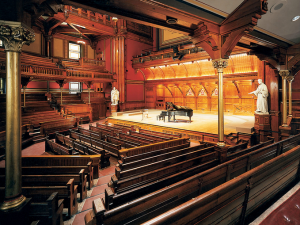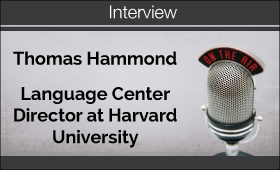Interview: Thomas Hammond on the Upcoming FLEAT VI Conference

Thomas Hammond, Director of the Language Center at Harvard University.
DOI: https://doi.org/10.69732/PZOU3481
Thom, can you introduce yourself?
I direct the Language Center at Harvard University. I came to Harvard from Japan in 1996 to start doctoral work in language acquisition. Although my wife and I had planned to return to Japan, the Language Center directorship became vacant when I was working on my dissertation, so I thought I’d try it for a couple years. That was 2004. I forgot to go back to Japan, so I guess it’s safe to say I like it at Harvard!
This year, the biennial IALLT conference will be at Harvard and it’s called FLEAT VI? What’s FLEAT?
FLEAT stands for Foreign Language Education And Technology. It is a joint conference sponsored by the International Association of Language Learning Technology (IALLT) and the Japan Association of Language Education Technology (LET). The first FLEAT was held in August 1981 in Japan, and the most recent was in 2005 at Brigham Young University in Provo, Utah. There is an excellent section on history of the conference at http://fleat5.byu.edu/previous.html. Rather than plagiarize the entire piece here, I should probably just refer your readers to the source!
Now, backing up a little bit, can you tell us about IALLT? Our K-12 reader especially might not be familiar with the organization.
I’ll try, though I’m not sure I’m the best person to describe the organization. I believe IALLT grew out of what had been some regional associations of language lab directors at colleges and universities. As the mission of language education has shifted and broadened with pedagogical and technological advances, so too has the mission of IALLT evolved, welcoming faculty and other professionals (not just “directors”) who use technology in support of language learning and teaching. As many members became more involved with organizations like ACTFL, I think the realization grew that our colleagues in K-12 settings not only face many of the same challenges we face in post-secondary settings, but they also bring a wealth of knowledge and experience to the conversation.
IALLT’s audience seems to be largely at the higher ed level. Will you have presenters and attendees at the K-12 level as well?
Yes, we received a number of proposals from K-12 practitioners, and from what the program committee tells me, they were some of the strongest proposals we received. I am looking forward to welcoming the presenters and their colleagues to Harvard next August!
Can you give us a sense of how big the conference is? How many concurrent tracks? What types of papers?
This is a really interesting question. The conventional wisdom based on the past few IALLT conferences was that it would be rather small — maybe 100-150 people. However, we received about 250 proposals, and if you assume that not everyone coming will propose a paper, this suggests a much larger conference than we originally anticipated. Many of the proposals came, as I mentioned, from K-12 practitioners; many also came from outside the U.S. The Program Committee is just finishing up its work, so I’m afraid I can’t give too many details at this stage. But it looks like we may have as many as 14 concurrent sessions in some time-slots. Sanders Theater, where we will have the keynotes, holds 1200.

When is the conference? What are the highlights of the program? Do you have keynotes picked out?
The conference is August 11-15, 2015. The theme is Identities, Communities, and Technologies in Global Environments. We are in discussion now about keynotes. I don’t want to say anything until we have reached an agreement, but suffice it to say I am very excited about the prospects.
What are the lodging options for attendees?
We spent an incredible amount of time on this because lodging costs are relatively high in Boston/Cambridge, and we were determined to get good value for our participants. After a lot of negotiation, we settled on the oldest hotel in the United States, the historic Omni Parker House, which is right in the middle of downtown Boston on the Freedom Trail. They gave us a very good price ($229) and some interesting amenities. For example, each room will get a free one-week “Charlie Card.” A Charlie Card is a system-wide pass for Boston’s “T” system of subways, buses, and water taxis. They also include free high-bandwidth wireless internet, morning coffee/tea delivered to your room, etc. A couple factoids: this hotel is the birthplace of the Parker House roll, of Boston cream pie, and had a very famous pastry chef in the 1920’s: Ho Chi Minh. Its restaurant is where JFK proposed to Jacqueline Bouvier. So you can tell I’ve been there a few times vetting the place!
Will there be any time for a little sight seeing?
We have some fun programmed into the conference schedule. For example, we will offer a DuckBoat tour of the city one evening, a pub crawl, and some student-led Harvard campus tours. There are lots of other attractions on our conference Website, and we are trying to come up with options for the whole family since we expect a lot of international visitors to come with partners and kids. A few that come to mind — Whale watching on Cape Cod, Hiking on the Freedom Trail; visiting museums in Salem, scene of the witch trials in the 1690’s.
More information about the conference is available at http://fleat6.fas.harvard.edu. Look for a lot of updates in the next two weeks: many decisions are right at the tipping point!

